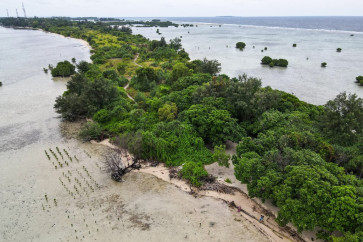NGOs to sue international standard pilot schools
As many as four non-governmental organizations (NGO) will file a lawsuit challenging the existence of international-standard pilot project schools (RSBI), arguing that they are against the spirit of the Constitution
Change Size

A
s many as four non-governmental organizations (NGO) will file a lawsuit challenging the existence of international-standard pilot project schools (RSBI), arguing that they are against the spirit of the Constitution.
The organizations are the Central Java Corruption, Collusion and Nepotism Eradication and Investigation Committee (KP2KKN), the Indonesian Corruption Watch (ICW), Institute for Policy Research and Advocacy (Elsam) and Education Coalition.
“A number of other NGOs are expected to join in the cause to sue the RSBI and the National Education System Law,” KP2KKN secretary Eko Haryanto said in a press release sent to The Jakarta Post on Tuesday.
He said the lawsuit would be filed at the Constitutional Court to revoke Article 50 (3) of Law No. 20/2003 on the National Education System, which has given a legal basis for the establishment of RSBI across the country.
The article stipulates that the central government and regional administrations have the responsibility to run at least one school for every level of education in the respective regions to be developed into international-standard schools.
The government met this requirement in 2007 by establishing RSBIs across the country. There are currently over 1,100 RSBIs of different education levels throughout Indonesia.
“We demand the revocation because it is against Article 31 (1), (2) and (3) of the 1945 Constitution. RSBIs are discriminating and thus against the spirit of creating social justice for all the people of Indonesia,” Eko said.
The NGOs, according to Eko, also see indications that the state is trying to move its responsibility to provide education for all onto the shoulders of the people instead.
“We see it as an effort to liberate education in Indonesia, in which the responsibility of the state to provide education, especially in terms of financing it, will eventually be moved to the responsibility of the citizens,” he said.
A similar perception was expressed by Eviyanti, 42, of South Purwokerto district in Banyumas, Central Java, whose child attends the Purwokerto RSBI junior high school.
“I have paid expensive admission and tuition fees since the beginning, yet we are still required to pay more for extra-hours classes to the respective teachers. So what is the difference with the regular schools?”
Suryanto, a teacher at state-run SMPN I Purwokerto, one of the RSBI in Banyumas regency, Central Java, highly appreciates the RSBI program. He said the program was an opportunity for the school to develop according to the demands of the time.
Suryanto said that the government should dig up more on the opinion of the wider community about the RSBIs before making any decisions. “If they can still accept it, then the RSBI is worth maintaining. If not, then a thorough evaluation needs to be done,” he said.
“What I can observe so far is that year after year we always receive abundant enrollments from which we can only accept only one third of them as our new students,” he added.









